
When I urge congregations to develop strategies to engage Millennial and Gen Z generations, someone inevitably says, “Maybe we should start a contemporary worship service to attract them.” The problem is: nothing in my research or experience leads to the conclusion that contemporary worship will attract younger generations. Indeed, is what we call contemporary worship even contemporary?
Contemporary worship services were created by the Boomers when they were young. Boomers grew up on rock and soft-rock music, with a drummer, a couple of guitars and a lead singer. Incorporating this kind of music into worship from the 1980s on did attract some Boomers. But most congregations have continued to decline since the mid-20th century whether they offered traditional worship, contemporary, or both.
A Question of Quality
In congregations that can hire professional musicians or engage skilled volunteers, the musical quality is high. But in other congregations, volunteer musicians play with passion and enthusiasm—but with less skill. They are to be thanked for their efforts, but as a guitar and piano musician myself, I feel awkward sitting through a contemporary worship experience where the musicians lack the skills worship requires. One friend currently looking for a church home described some of the music he has heard as “not ready for prime time.”
Even when the musical skill is high, the worship we call “contemporary” is a poor fit for younger people. Unlike their parents, the Millennial and Gen Z generations did not grow up nourished by rock and roll, so why are we feeding them soft rock in worship? Spotify’s marketing department advises that “Unlike generations past, Millennials aren’t loyal to any specific music genre. Instead, they pride themselves on being open-minded and constantly discovering the new, with 84% stating that their music tastes span multiple genres.”
Buzzfeed reports that “When Lockdown began, Gen Z got emo,” expanding the pop-punk genre to include a wider diversity of voices and leading a revival of K-pop. None of this music has much in common with soft rock from the 1970s and 1980s.
Tastes and Preferences
When I suggest that contemporary services are not the answer for attracting the youngest two generations, someone inevitably says, “But there are more young people at our early contemporary service than the traditional service.” I respond, “Yes, but they may be there primarily because it is early, not because it is contemporary.” As the median age dropped dramatically in the D.C. congregation I served for thirty years, the drumbeat for an early service increased in volume. The parents of little kids said, “John, our kids are up very early. Keeping them engaged until our 11 a.m. traditional service is a lot of work. We need an early worship service.” Survey your attendees at an early worship service and ask what brings them there: Time of day? Music style? Or something else?
The research on generational preferences in worship format suggests that Millennials and Gen Zers have no interest in the “worship format wars” over traditional versus contemporary styles that dominated my years in parish ministry. Baptist News reports, “Young adults are hungry for churches that are confident in identity, committed to service and genuine in fellowship.” The title of the article says it all: “Survey says: Millennials prefer contemporary worship; reality says: Not so fast.”
Authenticity, Not Style
Google “Millennial and Gen Z worship preferences,” and article after article, post after post, says the same thing. Younger generations are interested in authenticity, not a particular worship style. If they leave worship having had an inspirational experience led by authentic people, they may well return. If they feel like they were entertained by a performance rather than spiritually moved and uplifted, they most likely will not. They can get better entertainment and performance quality elsewhere.
The Barna Group’s research on worship and younger generations is summarized well by ResourceUMC:
Research indicates that most Millennials like sanctuaries better than coffee shops or auditoriums. In addition, they don’t mind overtly Christian images in their places of worship. They actually think the imagery helps them feel closer to God. And while a church’s size isn’t necessarily the most important factor, they tend to be like Goldilocks and prefer churches that are not too big, not too small, but just right. Millennials are like most of us when visiting a new place. They don’t want the congregation to be so small they stand out like a sore thumb, but they don’t want the congregation to be so large that they are just a number. In fact, many Millennials are somewhat turned off by megachurches that seem to them more like big business than a haven of peace and praise.
The late Rachel Held Evans, a widely followed Millennial blogger and author, wrote,
A church can have a sleek logo and Web site, but if it’s judgmental and exclusive, if it fails to show the love of Jesus to all, Millennials will sniff it out. Our reasons for leaving (the church) have less to do with style and image and more to do with substantive questions about life, faith and community. We’re not as shallow as you might think. If young people are looking for congregations that authentically practice the teachings of Jesus in an open and inclusive way, then the good news is the church already knows how to do that.
Whose Are We?
Is “contemporary worship” contemporary? No. The key to attracting younger generations is not the style of worship that attracted Boomers when they were young. I expect that contemporary worship services as we have known them, will mostly disappear as Boomers disappear. To attract younger generations, congregations must examine their entire ministry from Monday through Sunday. Are we authentically studying and practicing the teachings of Jesus? Is our worship a performance or a spiritual experience? Is our worship filled with authentic, uplifting, tried-and-true methods of connecting the attendees with God and neighbor? Does it lead directly to action that expresses spiritual commitment? Does it lead to deeper understandings of who—and whose—we are?
To attract the younger generations today, we can’t continue to argue about traditional versus contemporary worship experiences. Our worship, no matter what its form, needs to tap the deep wellsprings that our faith traditions have offered to every generation. Quality content in worship, not shifting to formats like contemporary worship, will give younger generations what they are searching for.
John Wimberly is an experienced pastor and consultant. As a consultant, he has worked with congregations and judicatories on strategic planning, staff designs for the 21st century, and congregational growth as well as financial and administrative management. He has MBA, MDiv, and PhD (theology) degrees. His books focus on effective management and leadership. John believes congregations can have a bright future!



